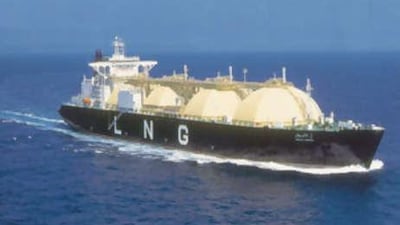The global market for liquefied natural gas (LNG) will double in the next eight years, the head of Algeria's state oil and gas company predicted yesterday at the World Petroleum Congress in Madrid. Mohamed Meziane, the chief executive at Sonatrach, also forecast that world LNG shipments will expand by eight per cent annually until 2020 as the volume of LNG spot trades grows on international markets.
Last year, the value of global LNG trade was about US$63.7 billion (Dh233.8bn), based on figures published in the BP Statistical Review of World Energy. Mr Meziane's projections suggest that the market could grow to at least $127bn by 2016, and possibly much more in the light of rising gas prices. Mr Meziane's forecast, reported by Dow Jones Newswires, followed news that Exxon Mobil, the US energy company, plans to bring significant Middle Eastern LNG supplies to market in the next two years.
"Joint ventures in Qatar, in which Exxon Mobil Corporation participates, will start up projects over the next two years that will bring more liquefied natural gas to market than any other international oil company," Exxon Mobil said. Speaking in Madrid, Rex Tillerson, the company's chief executive, said new proprietary technology developed by the energy industry was facilitating the development of a global gas market.
"Not only will a global LNG market help supply increasing energy demand, it will also strengthen global energy security by helping to diversify supplies. And because it is cleaner burning than other conventional sources, natural gas has important environmental advantages," he said. "Technological advances, pioneered with Qatar Petroleum and others, have enabled Exxon Mobil to achieve new economies of scale."
Exxon Mobil's plans to bring new LNG supplies to market hinge in part on a Qatari project - the Adriatic LNG terminal - which it is developing with the state-owned Qatar Petroleum and the US power company, Edison. Exxon Mobil said the LNG re-gasification project, which would have the capacity to provide 10 per cent of Europe's LNG needs, was nearing completion and scheduled to be moved into position offshore Italy in August.
Qatar and Algeria are the world's largest and fourth-largest LNG exporters. Last year they accounted for a combined 28 per cent of global LNG shipments. Other large international energy companies are also piling into the LNG business. According to Dow Jones, Linda Cook, who heads the gas business of the Anglo-Dutch group, Royal Dutch Shell, yesterday said at the World Petroleum Congress that Shell wanted to build a floating LNG facility in Australia. She also said Russia's Sakhalin LNG plant, in which Shell is a shareholder, was on track to be completed around the end of this year.
Nonetheless, Ms Cook pointed out that many energy exporting countries were increasingly looking at keeping natural gas for their own needs, and even importing the commodity, as the UAE has recently started to do. She cited Egypt, Trinidad, Australia and Nigeria - all currently LNG exporters - as examples. Most analysts, however, consider the LNG market to be immature. Last year, LNG's share of the world gas trade was just 29 per cent. Cross-border pipeline deliveries accounted for the rest.
The potential for the business to grow was further highlighted in Madrid yesterday by Helge Lund, the chief executive of StatoilHydro, the Norwegian state-controlled energy company. Substituting less-polluting natural gas for oil and coal could significantly curb global carbon dioxide emissions by creating a "bridge" to a less carbon-intensive economy, Dow Jones reported. Appealing to the oil industry to step up efforts to reduce carbon dioxide emissions from energy production, Mr Lund predicted that carbon emissions would increase 57 per cent by 2030 from 2005 levels, as world energy demand rose 55 per cent over the same period. He also said fossil fuels would remain a crucial part of the world's energy supply for the next 20 to 30 years.
Mr Lund made his remarks as China Coal Energy, the Asian country's second-largest coal producer by revenue, said its coal output in the first half of this year grew 14 per cent from a year earlier, and that its coking coal production soared by 38 per cent. Coking coal is primarily used as fuel to produce electricity. But even China, the prime contributor to a recent jump in coal consumption for power generation, is taking a hard look at its carbon emissions. Citing state sources, Reuters said yesterday that Beijing would take a series of measures this year to curb development of energy and pollution-intensive industries, eliminate outdated production capacity and increase its monitoring of major pollution sources.
Among other things, China would this year shut down small, inefficient, coal-fired power generators that produced 13 gigawatts of electricity, the news agency said. As host to this years summer Olympic Games in Beijing, China has recently come under intense environmental scrutiny from the international community. @email:tcarlisle@thenational.ae

